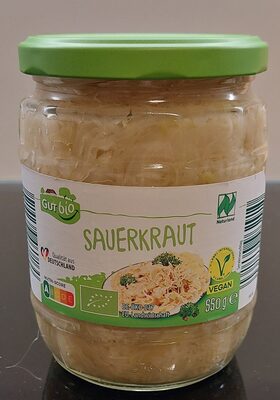
Barcode: 4061464962910
Bio-Sauerkraut
HALAL
📝 Reason: The product contains only plant-based ingredients and natural salt, which are universally accepted as Halal. There are no Haram or Doubtful ingredients present. Islamic dietary laws permit the consumption of all plant-based foods unless they are contaminated with Haram substances, which is not the case here.
📄 Certificates: None
Ingredients:
Details
Understanding the Halal Status of Bio-Sauerkraut
When it comes to adhering to Islamic dietary laws, understanding the Halal status of food products is essential. In this post, we delve into the Halal status of Bio-Sauerkraut and explore its ingredients and how they align with Halal guidelines.
What Makes Bio-Sauerkraut Halal?
Bio-Sauerkraut is confirmed to be HALAL, as it consists entirely of plant-based ingredients—specifically, Weißkohl (white cabbage) and Meersalz (sea salt). These natural components are universally accepted as Halal under Islamic dietary principles. Furthermore, there are no Haram or doubtful ingredients present in this product, making it compliant with the dietary restrictions mandated in Islam.
Ingredients Breakdown
Let’s take a closer look at the ingredients in Bio-Sauerkraut and their respective Halal statuses to understand their background:
- Weißkohl (White Cabbage)
- Halal Status: Halal
- Details: Weißkohl is a plant-based ingredient that is extensively used in a variety of culinary dishes. It is sourced directly from plants and is free from any contamination from Haram substances.
- Source: General Islamic dietary guidelines affirm that all plant-based foods are permissible unless affected by Haram ingredients.
- Meersalz (Sea Salt)
- Halal Status: Halal
- Details: Natural sea salt is derived from the evaporation of seawater. It is a fundamental ingredient that is widely used in cooking and food preservation, recognized for its flavor and health benefits.
- Source: Islamic guidelines classify natural substances like sea salt as Halal, provided they are not mixed with prohibited items.
Why Bio-Sauerkraut Fits Islamic Dietary Laws
The importance of adherence to dietary laws in Islam cannot be overstated, and each ingredient must be evaluated to ensure compliance. Islamic teachings stipulate that all plant-based foods—including fruits and vegetables—are inherently Halal unless proven otherwise. Therefore, we can confidently conclude that Bio-Sauerkraut, made solely from Weißkohl and Meersalz, is in full compliance with these precepts.
No Certifications Needed
Even though Bio-Sauerkraut does not carry any specific Halal certification, its ingredients alone validate its Halal status. Many consumers opt for products that are naturally Halal without the need for additional certification, as is the case here.
In summary, the absence of any Haram components and the nature of its plant-based ingredients make Bio-Sauerkraut a suitable dietary choice for individuals seeking Halal options. Furthermore, its simplicity and adherence to natural food principles align perfectly with the purchase preferences of health-conscious consumers.
Conclusion
In conclusion, if you’re looking for a Halal-certified food product, Bio-Sauerkraut stands as a solid option. Its simple, plant-based ingredient list, comprising only white cabbage and sea salt, assures compliance with Islamic dietary laws. Whether you’re incorporating it into a meal or enjoying it on its own, you can do so with confidence, knowing that it’s Halal.

